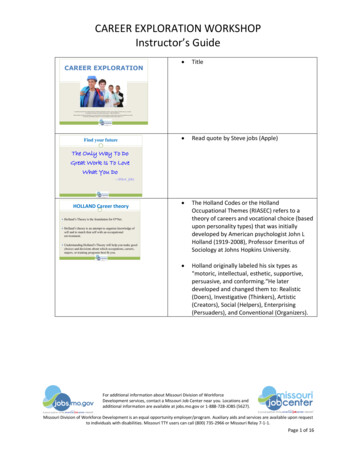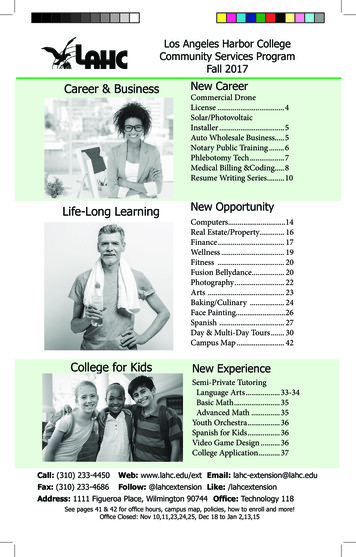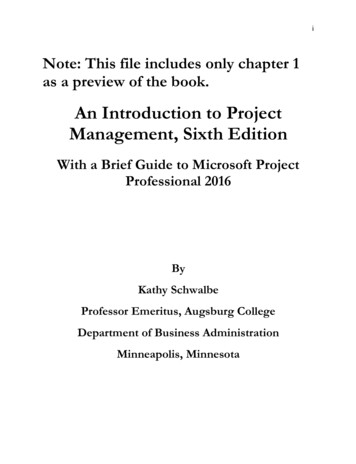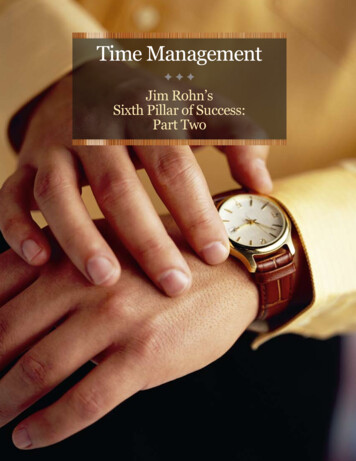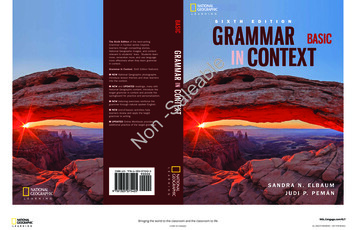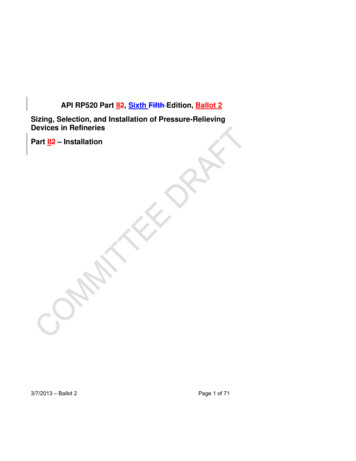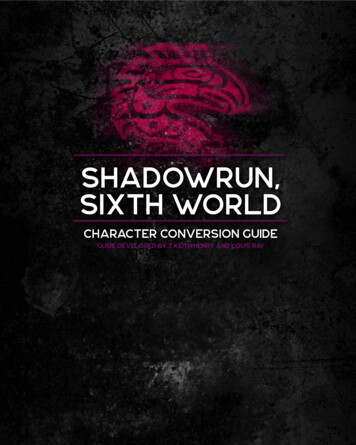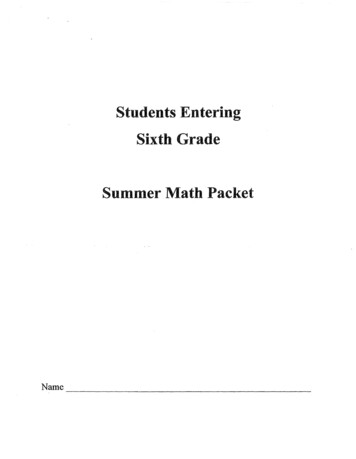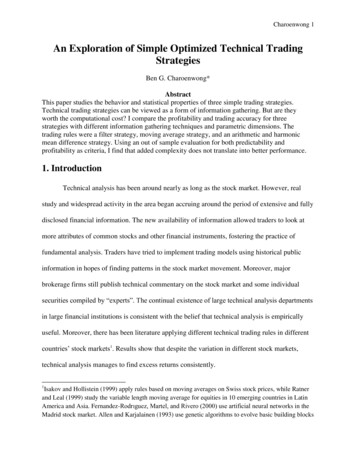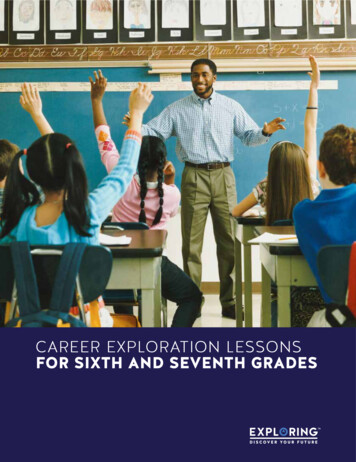
Transcription
CAREER EXPLORATION LESSONSFOR SIXTH AND SEVENTH GRADES
Table of ContentsIntroduction. 5ABC’s of Skills.7Achieving Your Career.11Ask an Employer. 15Avoiding Termination. 19Becoming A Proactive Worker.25Body Language.29Preparing for Career Exploration.35Career Exploration.39Career Fair.43Career Terminology. 49Conflict Resolution.53Dealing With Difficult Coworkers.57Dress for Success. 61Ethics.65Express Yourself.69Future Career Choices: Conducting a Job Search. 73Getting Along With Your Boss. 77Job Interviews. 81Know Your Rights.85Learning Styles: Which One Am I.89Learning Styles: Auditory.97Learning Styles: Tactile.101Learning Styles: Visual. 105Mapping Your Future. 109More Than the Minimum.119Office Etiquette.123Organization in the Workplace.127Overcoming Weaknesses. 131Personal and Professional Email Addresses. 135Personal Strengths. 139Resume Writing. 143Self-Assessment of Skills and Abilities. 149Telephone Etiquette. 155Time Management. 159Tomorrow’s Jobs. 165Occupations with the Fastest Growth. 166Understanding Benefits. 171Where Do I Want To Be.177Writing Professional Emails.181You Are Unique. 185What Have You Learned. 189
IntroductionExploring endeavors to develop citizens who are physically, mentally, and emotionally fit;have a high degree of self-reliance, evidenced in such qualities as initiative, courage, andresourcefulness; have positive personal character; have the desire and skills to help others;understand the principles of global social, economic, and government systems; are knowledgeable about and take pride in their American heritage and understand our nation’s rolein the world; have a keen respect for the basic rights of all people; and are prepared to participate in and provide leadership for a global society.Exploring has been developed to help fulfill this commitment to teaching all young peoplethe importance of character development, social skills, life skills, good citizenship, andphysical fitness. This is a classroom-based program to help students begin an in-depthassessment of their character and personal career search. It supplements and enriches thestandard curricula and the student’s career awareness.The program takes the students through a step-by-step, developmental, decision-makingprocess, helping each student become aware of their own strengths and uniqueness.Exploring provides the student with caring mentors and role models from the community,and gives each student an opportunity to learn the r elevance of education and the necessity of staying in school. It enhances the s tudents’ awareness of what they need to learn inorder to become productive members of society and why that is important to them. It alsoprovides the students with examples of moral and ethical choices in the working world.Program MethodsThe sixth and seventh grade program features age-appropriate, theme-oriented lesson plansto be used in the classroom to guide students through career exploration. There are 36 lesson plans and five revised lesson plans in this teacher’s guide. They may be conducted byan Exploring representative, community role model, business leader, or classroom teacher.Exploring incorporates an action-learning process and uses techniques such as role- playing,small group discussions, and scenario analysis. During the career exploration l esson plans, thestudents engage in critical thinking as they delve into such topics as workplace communication, job searches, and professional behavior analysis.Lessons are designed to reinforce career education skills in various areas, such as c riticalthinking, behavior analysis, conflict resolution, problem solving, workplace expectations,and communication skills.We suggest that at least one lesson be used each week. The discussion topics and activitiesin each lesson relate to one or more curricula subjects and should be helpful in meetingyour school district’s educational and developmental subjects.In some instances, a lesson plan will offer more activities than time allows. It is at the discretion of the teacher to select which activities to conduct during the time allotted, or todecide to continue the lesson at another time.Lesson plan topics are greatly enhanced by inviting community role models to share theirexpertise with the class.Career Exploration Lessons for Sixth and Seventh Grades5
NewABC’s of SkillsCareer Education Focus:1. Listing skills necessary for a career2. Understanding diversity in the workplace3. Applying skills to a careerRelated Standards: English/language arts, technology, social studiesLesson Objectives:1. Differentiate between knowledge and skills2. Compile a list of skills3. Examine the usefulness of skillsMaterials: ABC’s worksheet, My Skills worksheet, pens and pencilsProcedures:Explain to students that in addition to knowledge gained through the classroom, skills arealso very important in achieving success in a career. Ask the students if they can name thedifferences between knowledge and skills.Tell the students that everyone has different skills. There are some things you do betterthan your friends and there are some things they do better than you. Even though you canpractice some skills and improve them, others are part of your personality. You may have afriend who is naturally good at multiplying. No matter how much you study and take notesin math class, they are still able to do it faster than you. That doesn’t mean you aren’t goodat multiplying, though.Tell students that they will be using today’s worksheets to learn about skills, and that theymay discover they have more skills than they realize.Activity 1: Divide the students into small groups for the first worksheet. Pass out theABC’s worksheet. Explain that they are to come up with skills that start with each letterof the alphabet. Although the students are working as a group, each student in the groupshould fill out their own worksheet. They will need the completed worksheet for the second activity.Activity 2: If the students have moved to work as a group, have them return to their originalseats to complete the My Skills worksheet. Pass out the My Skills worksheet and explainto students that they are to use the skills from the first worksheet and pick at least four ofthose skills that they believe they possess. The students should list the skill and then brieflyexplain how it is useful.Assessment: Check to make sure all students have completed their own worksheets accurately and thoroughly.Reflection: Lead a class discussion on lessons learned. Were you able to develop a skillfor each letter of the alphabet? Were you surprised at the number of skills you possess?Career Exploration Lessons for Sixth and Seventh Grades7
ACTIVITY 1ABC’sWorking together as a group, come up with at least one skill for every letter of thealphabet. Although you are working as a group, each person should fill out theirown worksheet.ABCDEFGHIJKLMNOPQRSTUVWXYZ-8Career Exploration Lessons for Sixth and Seventh Grades
ACTIVITY 2My SkillsUsing the list of the skills that your group came up with, pick out four skills youthink you have from that list and give an example of how that skill is u seful.Skill 1Skill 2Skill 3Skill 4Career Exploration Lessons for Sixth and Seventh Grades9
NewAchieving Your CareerCareer Education Focus:1. Developing research skills2. Identifying requirements for potential careers3. Identifying actions that can be taken now to prepare for careersRelated Standards: English/language arts, technology, social studiesLesson Objectives:1. Understand the importance of proper planning2. Research potential careers3. Learn to plan now for future careersMaterials: How Do I Become A ? worksheet, Planning for my Career worksheet, pensand pencils, internet accessProcedures:Conduct a class discussion about how to plan to achieve your desired career. Today students will be learning about part of the planning that goes into selecting a career.Begin the discussion by asking students to name an exotic place they would like to visit. Letthe group offer a few suggestions and choose one that is far away and not easily accessible(i.e., Hawaii, Italy, etc.). Ask the students how they would plan a trip from the classroom tothis destination. Explain that to get there in the shortest time, they need a map to pick theroute that is best for them.Explain to students that just as they need a map when they take a trip, they also need amap to plan their journey from middle school to achieving the career they desire. Tell thestudents that, for example, a student may know they want to have a career where they“do something with computers.” Explain that depending on what they want to do, thereare different routes for them to take after high school. For example, if they want to designwebsites, they may want a two-year degree at a vocational school. If they are interestedin pursuing more, they may obtain various certifications. If they are interested in possiblymanaging or owning a technology company, they would want to get at least a four-yeardegree at a university.Activity 1: Pass out the How Do I Become A.? worksheet. Explain to students they are touse an internet search engine like Google to research the education requirements and necessary skills for a career they are interested in pursuing. Encourage students who don’t havean idea for a career to pick something that interests them and research it.Career Exploration Lessons for Sixth and Seventh Grades11
Activity 2: Pass out the Planning for My Career worksheet. Explain to students they are touse the space provided to write down ideas about exploring different careers.Assessment: Check to make sure all students have completed both worksheets a ccuratelyand thoroughly.Reflection: Lead a class discussion. How did you choose which career to research? Sharewhat you can do now to prepare for the career you chose.Resource Help: Adult volunteers to guide and supervise students as they accessthe internet12Career
use an internet search engine like Google to research the education requirements and nec-essary skills for a career they are interested in pursuing. Encourage students who don’t have an idea for a career to pick something that interests them and research it. New Achieving Your Career Career Education Focus: 1. Developing research skills 2. Identifying requirements for potential careers
